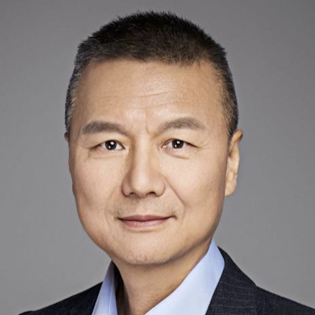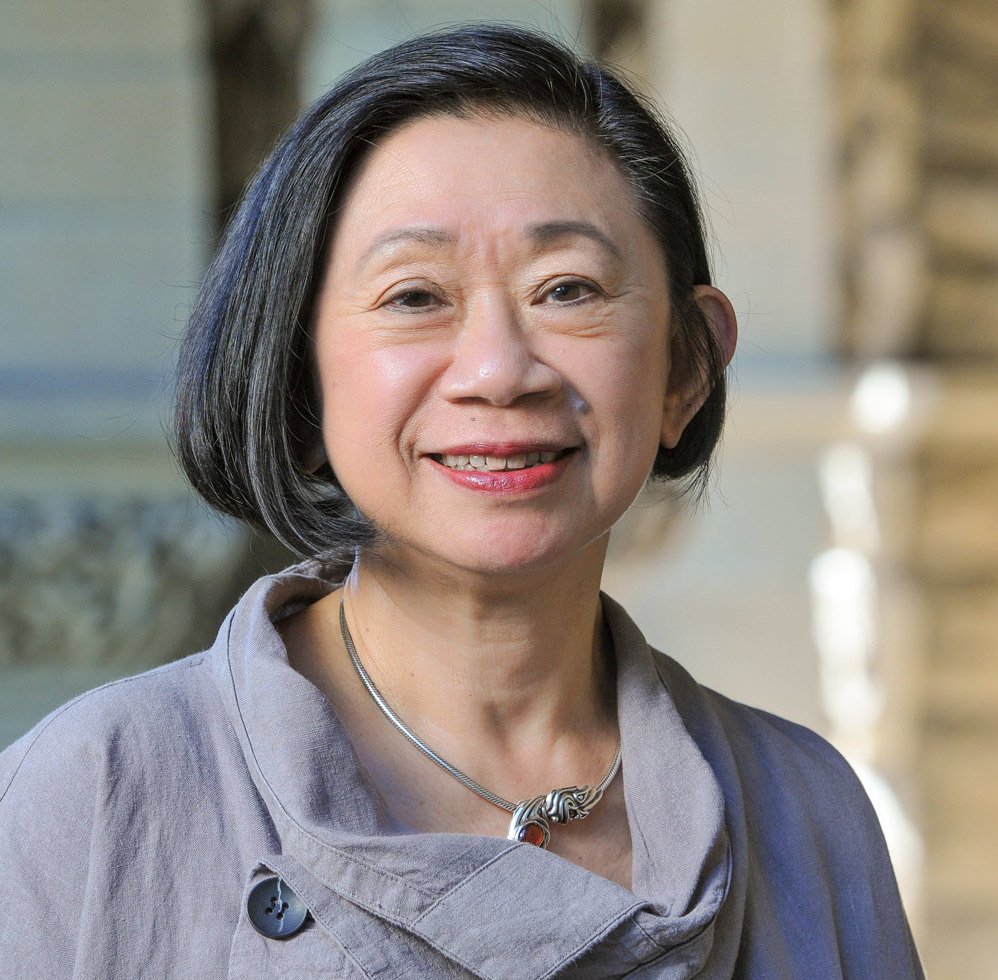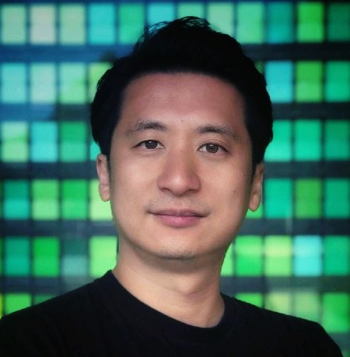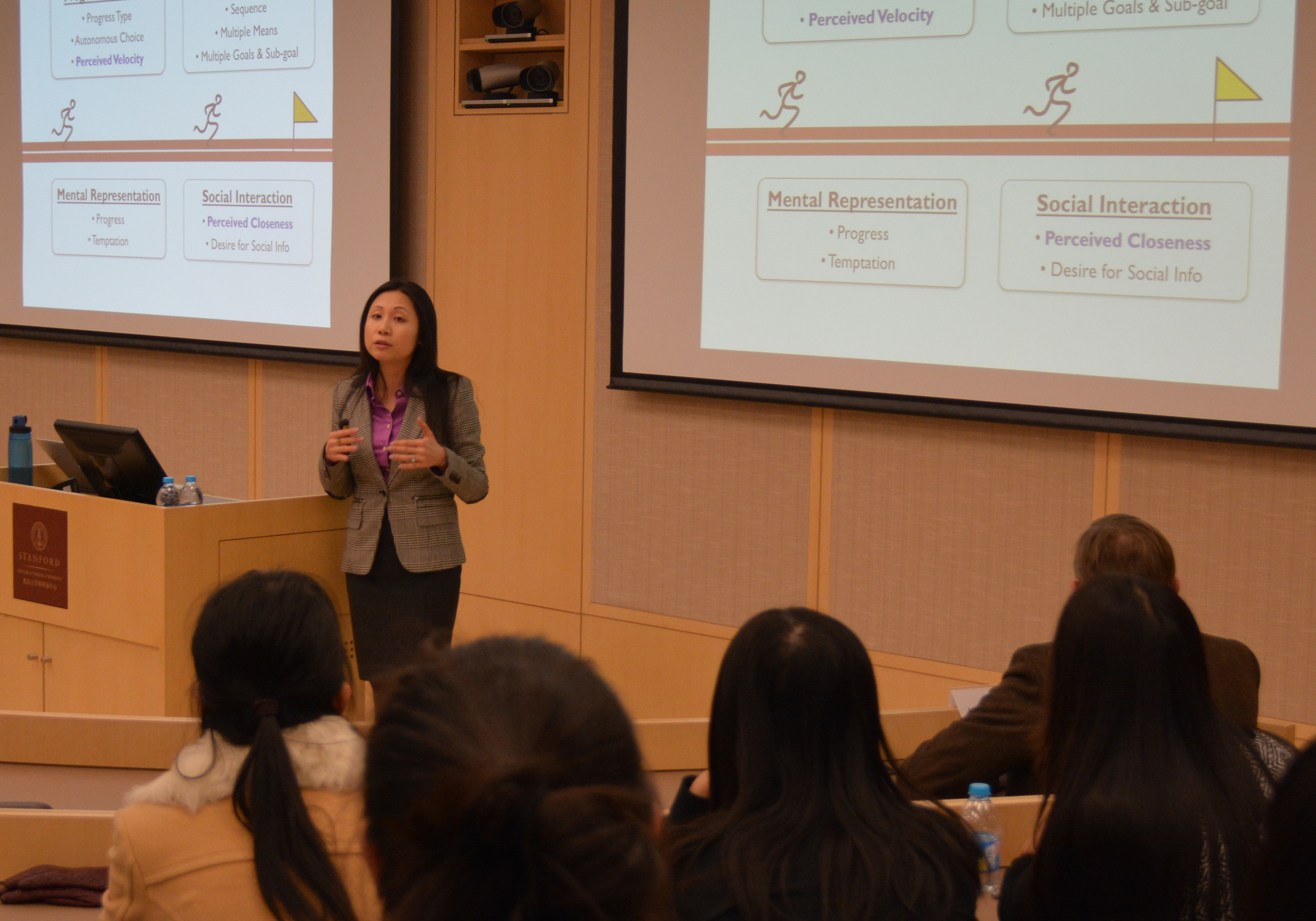The Lee Shau Kee World Leaders Forum on “US and the Asia Pacific” was held on November 13th, 2017. This event that brought 250 participants to the Center also marked the 5th anniversary of the Stanford Center at Peking University’s (SCPKU) anniversary and 10th anniversary of the Stanford China Program. Stanford Political Science Professor and SCPKU Director Jean Oi welcomed the audience with remarks highlighting Stanford’s initiative to build China studies at the home campus with the creation of the China Program and in China with the construction of SCPKU -- Stanford’s “Bridge Across the Pacific.” Professor Michael McFaul, Director of the Freeman Spogli Institute for International Studies at Stanford University, opened the forum with a stimulating keynote address on “The Historical Origins and Contemporary Consequences of President Trump’s Worldview.” In his talk, Prof. McFaul examined the President’s views and characterized them as fitting within but standing on the extreme end of long-standing foreign policy traditions. Combining his scholarly expertise with his experience in the Obama administration, Prof. McFaul offered the audience a sharp, wide-ranging but balanced overview of the continuities between Obama’s and Trump’s policies and the stark difference in rhetoric between these two Presidents. He used dynamic representations of isolationists versus internationalists, and realists versus liberals to explain that foreign policy differences exist within political parties rather than between them. Prof. McFaul took the audience around the globe, with timely accounts of the continuities, the positive changes and the adverse changes in US foreign policy under President Trump in, for example, the Middle East, Europe and Asia. Overall, he argued that democratic institutions in the US are open to evolution and renewal; that the structures of American leadership are still robust; and pointed to different historical periods (as during the inter-war period in the 1930’s; the rise of communism in the 1950’s; the rise of the Soviet Union in the 1970’s and Japan’s rapid ascendance in the 1980’s) when pundits declared America’s demise only to be proven wrong. Prof. McFaul asserted that current “predictions of permanent American decline is premature.” Prof. McFaul, however, did point to North Korea as a major point of worry, which segued into the panel discussion that followed.
[[{"fid":"229210","view_mode":"crop_870xauto","fields":{"format":"crop_870xauto","field_file_image_description[und][0][value]":"Professor Michael McFaul, Director of Stanford's Freeman Spogli Institute for International Studies, keynotes SCPKU's Lee Shau Kee World Leaders Forum.","field_file_image_alt_text[und][0][value]":false,"field_file_image_title_text[und][0][value]":false,"field_credit[und][0][value]":"Stanford University","field_caption[und][0][value]":"Professor Michael McFaul, Director of Stanford's Freeman Spogli Institute for International Studies, keynotes SCPKU's Lee Shau Kee World Leaders Forum.","thumbnails":"crop_870xauto","alt":"","title":""},"type":"media","field_deltas":{"4":{"format":"crop_870xauto","field_file_image_description[und][0][value]":"Professor Michael McFaul, Director of Stanford's Freeman Spogli Institute for International Studies, keynotes SCPKU's Lee Shau Kee World Leaders Forum.","field_file_image_alt_text[und][0][value]":false,"field_file_image_title_text[und][0][value]":false,"field_credit[und][0][value]":"Stanford University","field_caption[und][0][value]":"Professor Michael McFaul, Director of Stanford's Freeman Spogli Institute for International Studies, keynotes SCPKU's Lee Shau Kee World Leaders Forum.","thumbnails":"crop_870xauto","alt":"","title":""}},"link_text":null,"attributes":{"style":"height: 400px; width: 600px;","class":"media-element file-crop-870xauto","data-delta":"4"}}]]
Professor Michael McFaul, Director of Stanford's Freeman Spogli Institute for International Studies,
keynotes SCPKU's Lee Shau Kee World Leaders Forum.
Courtesy of Stanford University.
What will happen with North Korea was a focus of the lively high-level panel discussion chaired by Professor Jean C. Oi on “The US, China and Asia Pacific” with Karl Eikenberry, Former US Ambassador to Afghanistan, Director of US-Asia Security Initiative at Stanford; Kathleen Stephens, Former US Ambassador to the Republic of Korea and William J. Perry Fellow at Shorenstein APARC of Stanford; Thomas Fingar, Former chairman, National Intelligence Council; Former Assistant Secretary of State for Intelligence and Research; Shorenstein APARC Fellow; Yu Tiejun, Associate Professor and Vice President of the Institute of International and Strategic Studies at Peking University; and Zhu Feng, Executive Director, China Center for Collaborative Studies of the South China Sea and Director, Institute of International Studies at Nanjing University.
[[{"fid":"229211","view_mode":"crop_870xauto","fields":{"format":"crop_870xauto","field_file_image_description[und][0][value]":"SCPKU World Leaders Forum panelists discuss future of US-Asia Pacific relations.","field_file_image_alt_text[und][0][value]":false,"field_file_image_title_text[und][0][value]":false,"field_credit[und][0][value]":"Stanford University","field_caption[und][0][value]":"SCPKU World Leaders Forum panelists discuss future of US-Asia Pacific relations.","thumbnails":"crop_870xauto","alt":"","title":""},"type":"media","field_deltas":{"8":{"format":"crop_870xauto","field_file_image_description[und][0][value]":"SCPKU World Leaders Forum panelists discuss future of US-Asia Pacific relations.","field_file_image_alt_text[und][0][value]":false,"field_file_image_title_text[und][0][value]":false,"field_credit[und][0][value]":"Stanford University","field_caption[und][0][value]":"SCPKU World Leaders Forum panelists discuss future of US-Asia Pacific relations.","thumbnails":"crop_870xauto","alt":"","title":""}},"link_text":null,"attributes":{"style":"height: 400px; width: 600px;","class":"media-element file-crop-870xauto","data-delta":"8"}}]]
SCPKU World Leaders Forum panelists discuss future of US-Asia Pacific relations.
Courtesy of Stanford University
Prof. Fingar started the discussion on US-China relations, flatly rejecting the realist theory of conflict between rising and declining powers and the notion that “two tigers cannot get along.” He pointed out that interdependencies between the US and China have grown and that the US and China have more in common than ever before. Yet, with growing interdependence, chances for friction have also increased; thus, “having more issues,” he stated, “does not necessarily mean that the relationship is more fragile – perhaps the opposite [is true].” He also stated that China faces enormous challenges domestically and internationally, and that the US will be reacting to China rather than the other way around.
Amb. Stephens, Prof. Yu and Prof. Zhu all turned the discussion more squarely towards the intensifying North Korea missile crisis. The panelists all characterized this as a critical moment not only on the Korean peninsula but in all of Northeast Asia. Amb. Stephens stressed how important this is in the working relationship of the US and China as they strive to manage future crises and issues. While everyone found agreement on one common point – i.e., the implausible prospects of a “complete, verifiable, irreversible denuclearization” of North Korea -- each gave unique perspectives on what might happen on the Korean peninsula as the situation unfolds. Prof. Yu outlined three possible scenarios of (i) accepting North Korea as a nuclear power de facto; (ii) imposing increasingly draconian sanctions; and (iii) turning towards the military option against North Kore. But he did not express much optimism that any of these options would, in the end, provide good outcomes. Amb. Stephens, on the other hand, emphasized the strength and resilience of the US-ROK relationship stating “I wouldn’t underestimate [the US’] commitment to the ROK.” She also foresaw a future in which the US will conduct more military exercises, and install more anti-missile defense systems across Northeast Asia as a result of the North Korean threat – a prospect which, she surmised, the PRC would not welcome.
Prof. Zhu, on the other hand, offered a more optimistic perspective on the North Korean nuclear standoff by pointing to the increasing cooperation between the US and China. Asking the listeners to “please take the report that China is actively opposing North Korea seriously” he held out the hope that North Korea might return to the negotiating table once it saw that China was supporting the United States.
Amb. Eikenberry, as the final panelist to share his remarks, took the discussion to the broader Asia Pacific level and drew distinctions on “Asia Pacific” and “Indo Pacific,” as the latter description better reflects maritime flows, the geographical layout as well trade flows more accurately. He invited panelists to depict what would happen in different possible scenarios and outcomes relating to military crisis in the region. The panelists shared their views on action options involving sanctions and multilateral agreements, and agreed that countries should focus on achieving shared goals.


 FSI researchers consider international development from a variety of angles. They analyze ideas such as how public action and good governance are cornerstones of economic prosperity in Mexico and how investments in high school education will improve China’s economy.
FSI researchers consider international development from a variety of angles. They analyze ideas such as how public action and good governance are cornerstones of economic prosperity in Mexico and how investments in high school education will improve China’s economy.

 Alvin Shiqi Wang (王世琪) has served as CEO and President of 21Vianet Group, Inc. since February 2018. Currently, Mr. Wang serves as Vice President of TUS Digital Group, a subsidiary of TUS Holdings, and serves on the board of directors of Beijing CIC Technology Co., Ltd. and Guangzhou Tuwei Technology Co., Ltd. . Mr. Wang has nearly 20 years of experience in the telecommunications industry, working at various renowned international companies, including 11 years with Ericsson, focusing primarily on strategy development and execution, corporate management, and equity investments. Mr. Wang received a bachelor's degree from Tsinghua University and an MBA from Peking University-Vlerick MBA Programme (BiMBA).
Alvin Shiqi Wang (王世琪) has served as CEO and President of 21Vianet Group, Inc. since February 2018. Currently, Mr. Wang serves as Vice President of TUS Digital Group, a subsidiary of TUS Holdings, and serves on the board of directors of Beijing CIC Technology Co., Ltd. and Guangzhou Tuwei Technology Co., Ltd. . Mr. Wang has nearly 20 years of experience in the telecommunications industry, working at various renowned international companies, including 11 years with Ericsson, focusing primarily on strategy development and execution, corporate management, and equity investments. Mr. Wang received a bachelor's degree from Tsinghua University and an MBA from Peking University-Vlerick MBA Programme (BiMBA). Xiang Wang (王翔) is President and Acting CFO of Xiaomi Corporation, responsible for platform functions and for assisting the CEO with Group operations. Mr. Wang joined Xiaomi Corporation in July 2015 served as its Senior Vice President and President for International Business, responsible for global expansion, IP strategy, and strategic partner relationship management. Mr. Wang has more than 20 years of experience in the semiconductor and communications fields, with great vision and comprehensive understanding of next-generation wireless communications. He has played an integral role in shaping Xiaomi’s international business operations including with respect to its intellectual property compliance, management and strategy throughout the world. In 2016, Mr. Wang put together an international team of sales and marketing teams to expand into more markets outside of China. Within just 3 years, he led his teams into over 90 markets. As of Q3 2019, Xiaomi’s international revenue accounted for 48.7% of its total revenue. Today, Xiaomi is ranked among top 5 smartphone brands in over 40 markets. Mr. Wang previously served as the Senior Vice President of Qualcomm and President of Qualcomm Greater China, leading the company’s business and operations in Greater China. Prior to that role, he was Vice President of Qualcomm CDMA Technology, responsible for Qualcomm chipset business and customer service in China. Under his leadership, Qualcomm rapidly extended and strengthened its partnerships with increasing numbers of Chinese manufacturing customers. Before joining Qualcomm, Mr. Wang held key positions in sales and marketing at internationally leading companies, including Motorola and Lucent/Agere. Mr. Wang earned his BSEE from Beijing Polytechnic University.
Xiang Wang (王翔) is President and Acting CFO of Xiaomi Corporation, responsible for platform functions and for assisting the CEO with Group operations. Mr. Wang joined Xiaomi Corporation in July 2015 served as its Senior Vice President and President for International Business, responsible for global expansion, IP strategy, and strategic partner relationship management. Mr. Wang has more than 20 years of experience in the semiconductor and communications fields, with great vision and comprehensive understanding of next-generation wireless communications. He has played an integral role in shaping Xiaomi’s international business operations including with respect to its intellectual property compliance, management and strategy throughout the world. In 2016, Mr. Wang put together an international team of sales and marketing teams to expand into more markets outside of China. Within just 3 years, he led his teams into over 90 markets. As of Q3 2019, Xiaomi’s international revenue accounted for 48.7% of its total revenue. Today, Xiaomi is ranked among top 5 smartphone brands in over 40 markets. Mr. Wang previously served as the Senior Vice President of Qualcomm and President of Qualcomm Greater China, leading the company’s business and operations in Greater China. Prior to that role, he was Vice President of Qualcomm CDMA Technology, responsible for Qualcomm chipset business and customer service in China. Under his leadership, Qualcomm rapidly extended and strengthened its partnerships with increasing numbers of Chinese manufacturing customers. Before joining Qualcomm, Mr. Wang held key positions in sales and marketing at internationally leading companies, including Motorola and Lucent/Agere. Mr. Wang earned his BSEE from Beijing Polytechnic University.
 Zhiqiang (ZZ) Zhang (张志强) is President of ABB in China since October 2018. He has extensive management experience and a deep understanding of the Chinese market, developed during his career at several large global companies over the past three decades. He joined ABB from Sandvik where he was Asia- Pacific Regional Holding Officer and President of Sandvik China, and Member of Sandvik Group Executive Committee. Prior to that, he held leadership positions at several other companies, including Nokia Siemens Networks, where he was President of the Greater China Region, and Siemens VDO Automotive, China, where he was President and CEO. Mr. Zhang is Non-Executive Board member of Georg Fischer AG (Switzerland) and Daetwyler Holding AG (Switzerland). He holds a bachelor’s degree in electronic engineering from Beijing Jiaotong University, China, and a master’s degree in business administration from the Smith School of Business at Queen’s University in Canada.
Zhiqiang (ZZ) Zhang (张志强) is President of ABB in China since October 2018. He has extensive management experience and a deep understanding of the Chinese market, developed during his career at several large global companies over the past three decades. He joined ABB from Sandvik where he was Asia- Pacific Regional Holding Officer and President of Sandvik China, and Member of Sandvik Group Executive Committee. Prior to that, he held leadership positions at several other companies, including Nokia Siemens Networks, where he was President of the Greater China Region, and Siemens VDO Automotive, China, where he was President and CEO. Mr. Zhang is Non-Executive Board member of Georg Fischer AG (Switzerland) and Daetwyler Holding AG (Switzerland). He holds a bachelor’s degree in electronic engineering from Beijing Jiaotong University, China, and a master’s degree in business administration from the Smith School of Business at Queen’s University in Canada. Jean C. Oi is the William Haas Professor of Chinese Politics in the Department of Political Science and a senior fellow in the Freeman Spogli Institute for International Studies at Stanford University. She directs the China Program at the Walter H. Shorenstein Asia-Pacific Research Center and is the Lee Shau Kee Director of the Stanford Center at Peking University. Professor Oi has published extensively on China’s reforms. Recent books include Zouping Revisited: Adaptive Governance in a Chinese County, coedited with Steven Goldstein (Stanford University Press, 2018), and Challenges in the Process of China’s Urbanization, coedited with Karen Eggleston and Yiming Wang (2017). Current research is on fiscal reform and local government debt, continuing SOE reforms, and the Belt and Road Initiative.
Jean C. Oi is the William Haas Professor of Chinese Politics in the Department of Political Science and a senior fellow in the Freeman Spogli Institute for International Studies at Stanford University. She directs the China Program at the Walter H. Shorenstein Asia-Pacific Research Center and is the Lee Shau Kee Director of the Stanford Center at Peking University. Professor Oi has published extensively on China’s reforms. Recent books include Zouping Revisited: Adaptive Governance in a Chinese County, coedited with Steven Goldstein (Stanford University Press, 2018), and Challenges in the Process of China’s Urbanization, coedited with Karen Eggleston and Yiming Wang (2017). Current research is on fiscal reform and local government debt, continuing SOE reforms, and the Belt and Road Initiative. Christopher Thomas was most recently a partner with McKinsey & Company. He served as co-Managing Partner for the Firm’s Global Digital Strategy service line as well as its Global IoT service line; and as the leader of its Asia Semiconductor Practice. Prior to McKinsey, Mr. Thomas spent ten years at Intel. He was the General Manager of Intel China, with joint ownership for the region’s $5 billion-plus P&L. In this role, he grew revenues by more than 50% and oversaw China’s successful elevation from a sales unit to an independent regional P&L business reporting directly into headquarters. Mr. Thomas began his career as a private equity investor at The Blackstone Group in New York City. He is currently a Visiting Professor at Tsinghua University, China’s leading educational institution. He received an MBA from Stanford Business School, where he was an Arjay Miller scholar; a Master of Arts in Political Science from Stanford University; and a Bachelor of Science in Economics, summa cum laude, from the Wharton School.
Christopher Thomas was most recently a partner with McKinsey & Company. He served as co-Managing Partner for the Firm’s Global Digital Strategy service line as well as its Global IoT service line; and as the leader of its Asia Semiconductor Practice. Prior to McKinsey, Mr. Thomas spent ten years at Intel. He was the General Manager of Intel China, with joint ownership for the region’s $5 billion-plus P&L. In this role, he grew revenues by more than 50% and oversaw China’s successful elevation from a sales unit to an independent regional P&L business reporting directly into headquarters. Mr. Thomas began his career as a private equity investor at The Blackstone Group in New York City. He is currently a Visiting Professor at Tsinghua University, China’s leading educational institution. He received an MBA from Stanford Business School, where he was an Arjay Miller scholar; a Master of Arts in Political Science from Stanford University; and a Bachelor of Science in Economics, summa cum laude, from the Wharton School.



